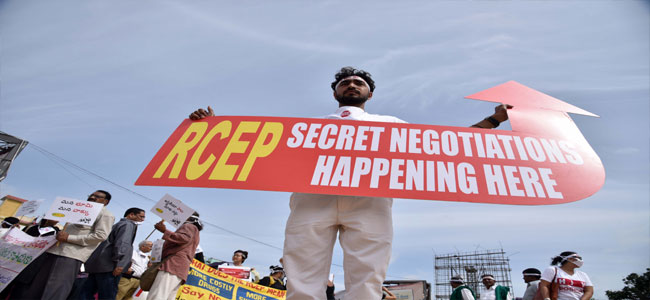India joining RCEP trade pact could be disastrous: NITI Aayog

Live Mint | 26 April 2018
India joining RCEP trade pact could be disastrous: NITI Aayog
by Asit Ranjan Mishra
New Delhi: Government think tank NITI Aayog, in a note on free trade agreements (FTAs) and their costs for India, has argued that the country needs to rethink joining the Regional Comprehensive Economic Partnership (RCEP) as it will be disastrous to provide more market access to China, which is a key player in the grouping.
“Given India’s inability to negotiate a good services deal in the past, RCEP negotiations, especially with China, need a second thought. Indian industry will have more to lose than gain if it agrees to a liberal tariff elimination schedule specially with respect to China. At a time of growing protectionism and the US’ stance towards China, opening our market to China can be prove to be disastrous, given that proper standards and processes are not in place in India,” the note authored by NITI Aayog member V.K. Saraswat, Mumbai-based economist Prachi Priya and Aniruddha Ghosh, who works in the office of Saraswat, said.
RCEP is a proposed trade pact between 10 Asean countries and their six FTA partners, namely Australia, China, India, Japan, Korea and New Zealand. It accounts for 25% of global GDP, 30% of global trade, 26% of foreign direct investment (FDI) flows and 45% of the total population.
This is not the first time that government agencies or officials have opposed India joining the 16-member RCEP grouping.
In an interview with Mint in February, chief economic adviser in the finance ministry Arvind Subramanian said India needs to be extra cautious and take into account geostrategic issues while moving ahead with the RCEP deal as it will also mean opening up the market to its adversary China.
Former foreign secretary S. Jaishankar, at a presentation before the parliamentary standing committee on commerce, called for “observance of due restraint” and warned against concluding trade arrangements that are not in India’s medium-term interest.
Mint reported on 14 March that the prime minister’s office held a meeting of secretaries of various government departments on 6 March where most of those present opposed India’s signing of the RCEP deal. A final decision on whether India will quit RCEP negotiations has been left to Prime Minister Narendra Modi.
The NITI Aayog note said while trade agreements are a means to promote bilateral trade, with both parties benefiting as a result of trade complementarities, with China, India’s trade seems to be skewed and China’s capacity overhang in most sectors may lead to a surge of imports into India with very limited access for Indian exports to the Chinese market.
China is India’s biggest trading partner, accounting for almost 10% of overall trade. Sino-Indian bilateral trade increased from a mere $1.8 billion in FY2000 to $72 billion in FY2017. India’s trade deficit with China, at $52 billion, now accounts for almost half of its total trade deficit, rising from $0.6 billion in 2000-01.
India’s exports to RCEP account for about 15% of its total exports and imports from RCEP comprise 35% of total imports. India’s trade deficit with RCEP has risen from $9 billion in FY05 to $83 billion in FY17, of which China alone accounts for over 60% of the deficit.
India already has bilateral FTAs with Asean, Korea and Japan and negotiations are underway with Australia and New Zealand.





